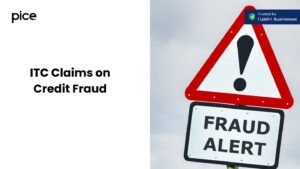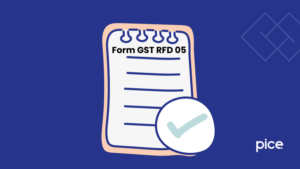Inspection Search and Seizure Under GST Guide
- 5 Nov 25
- 11 mins
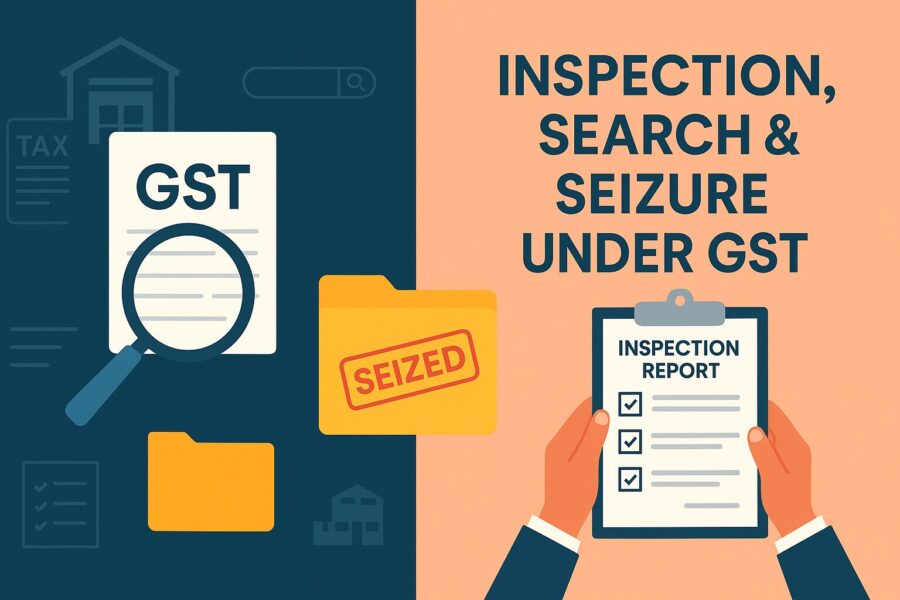
Inspection Search and Seizure Under GST Guide
Key Takeaways
- Inspection under GST allows officers to verify tax compliance and detect possible tax evasion.
- Search under GST is conducted when authorities have “reasons to believe” goods or evidence are concealed.
- Seizure under GST empowers officers to legally take possession of goods or documents suspected of violations.
- Detention differs from seizure — detention restricts movement, while seizure involves actual possession.
- Know your rights during arrest under GST, including written notice and production before a magistrate within 24 hours.
Have you ever thought about what happens if the GST authorities in India suspect a business of possible tax evasion? The government's anti-tax evasion scheme is in full swing. As a result, the Goods and Services Tax laws have been fully equipped with stringent protocols which allow for inspection and searching of business premises, if suspicion arises.
This is done with the aim to ultimately ensure fair tax compliance under the GST Act & Rules.
As per orders regarding detention and seizure of goods and services/conveyance, a 25% penalty is required to be paid for initiating an application for appeals under the CGST Act, section 107.
As a business owner, you must understand the provisions of inspection, search, and seizure under GST Notifications to bypass unexpected encounters with the authorities and ensure law compliance.
What is the Process for Inspection under GST?
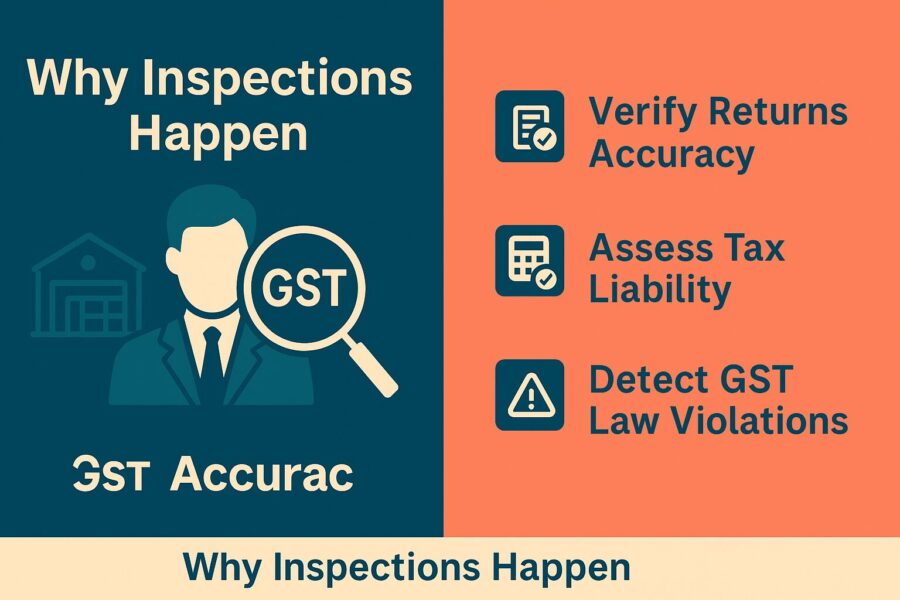
The process for inspection under GST involves an in-depth examination of a business's premises, their records, as well as the documents which ensure tax compliance. Authorised GST officers shall conduct inspections to:
● Verify the accuracy of returns
● Assess tax liability
● Detect and strike down any GST law violation
When is an Inspection under GST Required?
If a Joint Commissioner/officer of a higher rank holds "reasons to believe" that an individual has done any of the following, to evade taxes:
● Claimed extra ITC (input tax credit)
● Suppressed the stock in hand
● Suppressed the transaction of supply
● Violated any of the provisions
● A transporter or a warehouse owner/operator has kept items that have escaped State tax payment/has held onto accounts and/or goods to evade tax
The officer can authorise any officer to inspect the places of businesses via Form GST INS-01, of:
● The transporter
● The taxable person
● The warehouse owner/operator
He is also authorised to examine any other place if he deems it necessary.
More About “Reasons to Believe”
The phrase "Reason to believe" in the context of legalities, means having the deduced knowledge of certain facts (but not necessarily having direct knowledge), which would make any reasonable person, being aware of the same facts, arrive at the same conclusion.
According to the Indian Penal Code, 1860, an individual is said to have a "reason to believe" something, given that they have enough cause to believe it.
The “reason to believe” is a specific determination which is based on intellectual evaluation; different from a purely subjective consideration (an opinion). It is supposedly based on facts and not on the probable factual interpretation.
If you're wondering whether or not it is necessary to record the 'reasons to believe' in writing, prior to the issuance order for inspection notice, search or seizure, note that the GST Act does not insist on recording it. The Finance Act, 2017 has amended Section 132(1) and (1A) of the Income Tax Act. They retrospectively state that the "reason to believe", will not be disclosed to any person/authority or even the Appellate Tribunal.
The Meaning of Search under GST
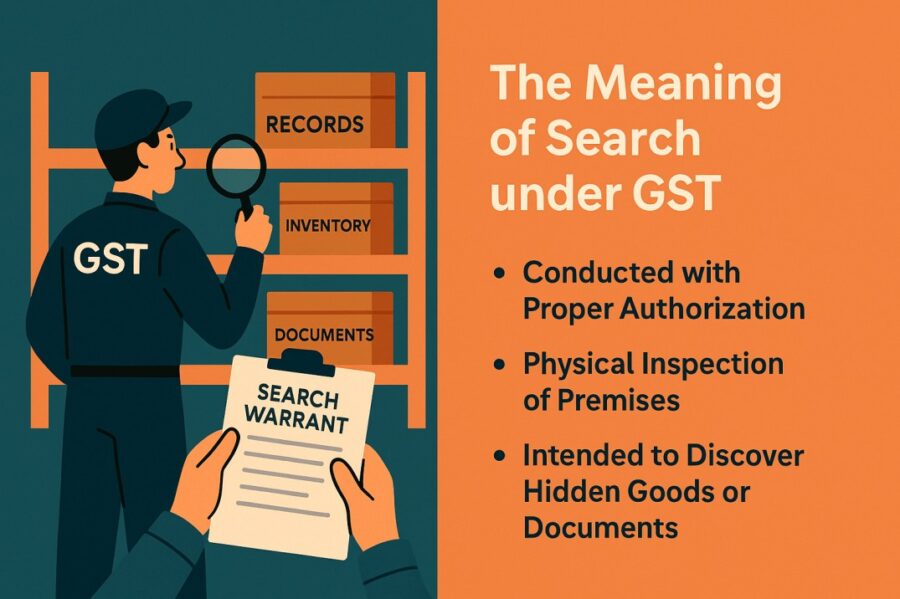
‘Search’ under GST in India is an attempt by a government official to find something that points towards tax evasion. In a tax/legal context, a search is the action undertaken by a GST officer/police officer (depending on the specific case) to look through/examine a place, individual or object carefully.
In order to uncover something that is being concealed or to find evidence of a crime, a search is initiated. This search may be conducted only under the proper authority of legal frameworks.
When Can a Search Be Ordered & by Whom?
As per the results of an inspection or for some other reason, the Joint Commissioner of SGST/CGST/ an officer holding a higher rank can authorise a 'search' if he has "reasons to believe" that:
● There are items in possession which may be liable for confiscation
● Documents/books/other items which shall be needed during proceedings and are possibly hidden
The officer himself can, or authorises another officer to, search and seize goods/documents.
What is a ‘Search Warrant’?
A 'search warrant' is a written form of authority extended to officers. It allows for the search to be conducted. The authorities deemed competent to get the search warrant include:
● An officer of the rank of Joint Commissioner
● An officer of a superior rank to that of the Joint Commissioner
A search warrant is required to show the existence of a ‘reasonable belief’ which shall deem the search justifiable.
Here are the details contained in the search warrant:
1. Violation under the Act,
2. The premise that is to be searched,
3. The name as well as the designation of the officer authorised for the search,
4. The name of the issuing officer with details about their full designation, along with the round seal,
5. The date as well as place of issue,
6. The serial number associated with the search warrant,
7. The period of validity (1 or 2 days etc.)
The Meaning of Seizure under GST
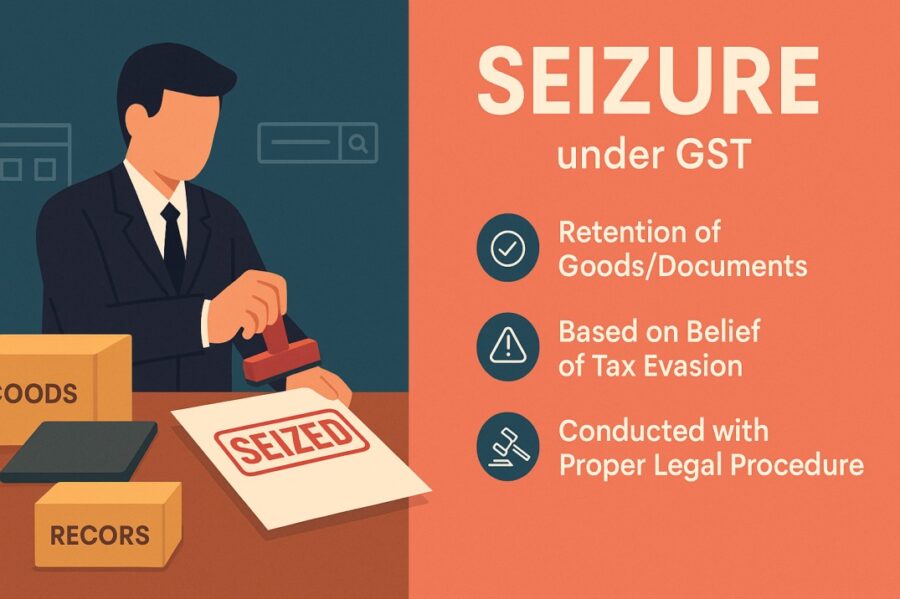
'Seizure' is not particularly defined under GST in India. In legal parlance though, seizure is essentially the act of taking something/someone against their will, through a legal process. Consider the example of the 'seizure of evidence' found at a crime scene.
The term is typically used to imply taking possession of something forcibly, against the owner's wishes.
How Long Will the Books/Documents Be in the Officer's Possession After Seizure?
The authorised officer shall keep the seized books and documents as long as it is deemed necessary for thorough examination/inquiry. Books which may not be relevant to the specific issue of notice shall be returned within 30 days, starting from the notice date.
The seized items may be released on a provisional basis. This will be against a bond for the goods' value in FORM GST INS-04. The owner will also be required to provide a security amount in the form of a bank guarantee for the due amount. This shall include:
● Applicable tax
● Interest
● Penalty payable
In case the owner does not produce the provisionally released items on the decided date and place, the security deposit shall be encashed and adjusted as per the due amount.
What Comes After the Seizure?
Here’s what follows the seizure of goods under GST:
● An entity, whose documents have been seized, may make copies of the same. But this is allowed only under the supervision of an officer.
● If the notice is not issued within 6 months of the seizing of goods, they shall be returned.
● The Government may specify a list of hazardous/perishable items which need to be disposed of as soon as they have been forcibly taken.
● All the items seized shall be listed properly by the authorised officer.
What Distinguishes a Seizure from Detention?
It is called detention when access is not granted to the owner to the seized goods as per legal order or notice. Yet, the owner wields ownership over the goods. This order is issued if it is suspected that the items may be liable to confiscation.
On the other hand, seizure means taking over/real possession of the items by the authorised department. The ownership shall still be with the owner though. Note that a seizure can be made after an inquiry or investigation that the items are liable to confiscation.
What is an Arrest under GST?
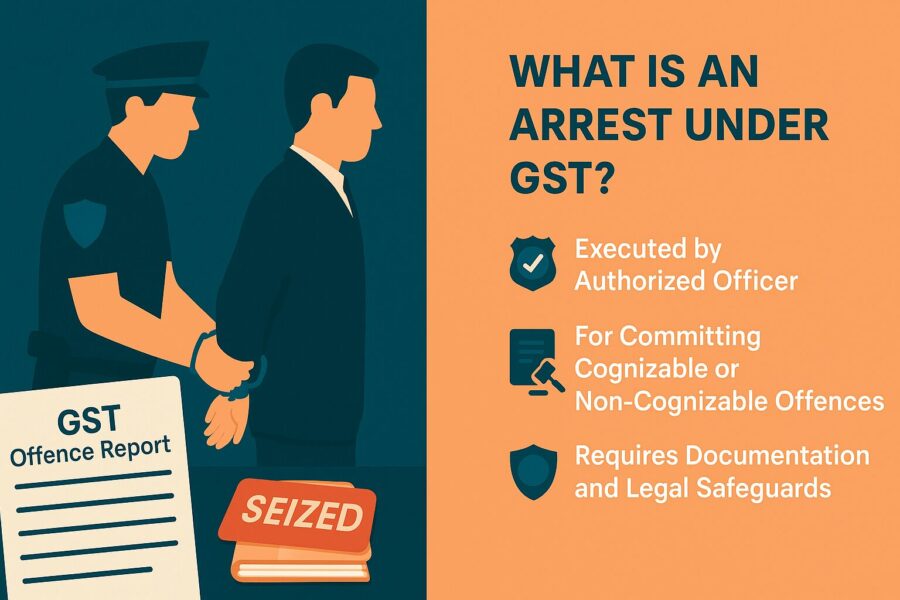
If the CGST/SGST Commissioner believes that an individual has committed a crime u/s 132, the latter shall be arrested by the authorised CGST/SGST officer. The grounds of arrest will be specified to the arrested individual. They will be able to appear in front of the magistrate if it's a cognizable offence, within 24 hours.
When May a Person be “Arrested” Under the CGST/SGST Act with the Relevant Officer's Approval?
Here are the circumstances under which a person may be "arrested" under the CGST/SGST Act with the authorised officer's approval:
● If a taxable person supplies certain goods or services without providing an invoice/issues a false invoice
● If a taxable individual issues an invoice/bill without the supply of goods and services, violating the GST provisions
● If a taxable entity collects the GST amount but fails to submit the same to the government within 3 months
● Even if the taxable person collects GST in contravention of provisions, they must deposit the same with the government within 3 months; not being able to do so shall count as an offence under GST
● If the taxpayer has been convicted earlier u/s 132 i.e., it is his 2nd offense
What Protections are Offered to Someone Brought under Arrest by the CGST/SGST Act?
Here are the protection measures provided under section 69 to someone brought in under arrest by the CGST/SGST Act:
● If an individual is arrested for a cognizable offence, they need to be informed of the grounds of arrest in writing; they must also be presented before a magistrate within 24 hours of their arrest.
● If an individual is arrested for a non-cognizable/bailable offence, the Assistant Commissioner of CGST/SGST/the Deputy may release them on bail. They are subject to the same provisions as the officer-in-charge of a police station under the Code of Criminal Procedure, 1973, section 436 of the Code;
● An arrest should be as per the provisions of the Code of Criminal Procedure, 1973 (CrPC) associated with arrest.
Conclusion
The provisions of inspection, search, and seizure under GST allow tax authorities to effectively curb tax evasion. They help ensure compliance with otherwise complex GST Notifications and legal obligations.
With a clear understanding of the provisions, businesses shall be able to prepare themselves for potential inspections and searches, if circumstances lead to such ends.
Business owners can undertake the necessary steps to maintain accurate records, ensure Vendor Payments are traceable, and consistently file ITR while complying with GST regulations. Ultimately, a thorough understanding of the provisions shall allow businesses to navigate the complexities of GST and bypass unnecessary penalties/fines.
Stay up-to-date and compliant, as a business body; focus on long-term growth and development, with a clearer perspective on such topics, and know your legal remedies in case of disputes.
💡If you want to streamline your payment and make GST payments via credit, debit card or UPI, consider using the PICE App. Explore the PICE App today and take your business to new heights.
 By
By 








